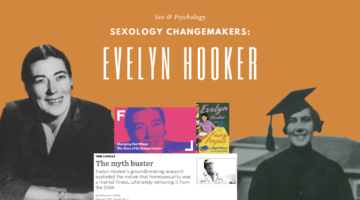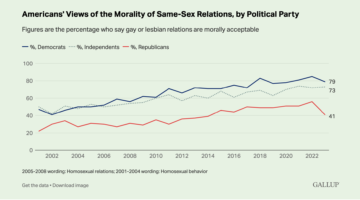5 Things You Should Know About Asexuality
January 13, 2016 by Justin Lehmiller
A small percentage of the population is asexual. This term is often defined as either a lack of sexual attraction or a lack of desire for partnered sexual activity. Asexuality is something that many people are not familiar with and, as a result, there are a lot of myths and misconceptions about it. So, let’s take a moment to review some key facts about asexuality that have emerged from the science to date. To learn more about this topic, I highly recommend Anthony Bogaert’s recent book, Understanding Asexuality.
1.) Being asexual is not the same as being celibate. Although people in both groups tend to avoid sexual activity, they are motivated to do so for very different reasons. Asexual persons do not experience sexual attraction in the first place, whereas celibate persons do and make a conscious choice not to act upon their feelings of attraction for a period of time. There are a large number of reasons someone who feels sexual attraction might choose celibacy (e.g., religion, health considerations, substance abuse recovery).
2.) Asexuality does not mean that one has a sexual dysfunction or a fear of sex. Consider a study in which asexual and non-asexual women were shown a series of erotic films [1]. While watching these films, participants’ genital arousal levels were recorded. In addition, they reported their subjective feelings of sexual arousal and their emotional state on a survey. The results revealed no differences in psychological or genital arousal between groups, which indicates that being asexual does not necessarily mean that one is unresponsive to erotic stimuli or that one’s genitals are not functional. Moreover, whereas sexual women showed an increase in positive affect while watching these films, asexual women experienced no changes (positive or negative) in their emotional state, indicating that asexuality is not a simple aversion to sex.
3.) Being asexual does not necessarily mean that one is sexually inexperienced and/or single. Indeed, research has found that many persons who report a lack of sexual attraction are involved in relationships, and some of them are having sex, too. It is important to keep in mind that lacking sexual attraction is not the same as lacking romantic attraction—asexuals often still desire romantic relationships. And, if partnered with someone who is sexual, asexuals may be sexually active either because they want to please their partner or, potentially, because they feel a sense of obligation.
4.) Studies have found that many self-identified asexual persons masturbate, and some have sexual fantasies, too. However, compared to sexual persons, asexuals are less likely to do both. Masturbation is a very different experience for many asexuals, though, in that it is often a “non-directed” activity (i.e., they are not thinking about a specific erotic image while it is happening).
5.) Many scientists are now arguing that asexuality should be considered a distinct sexual orientation. As some support for this idea, research has found that some of the same biological factors correlated with homosexuality are also correlated with asexuality (e.g., higher odds of being left-handed and, at least for men, being later born). This suggests that there may be a complex series of biological factors that contribute to the emergence of an asexual orientation. Check out this article to learn more about why some scientists believe asexuality is a sexual orientation.
Want to learn more about Sex and Psychology? Click here for more from the blog or here to listen to the podcast. Follow Sex and Psychology on Facebook, Twitter (@JustinLehmiller), or Reddit to receive updates. You can also follow Dr. Lehmiller on YouTube and Instagram.
[1] Brotto, L. A., & Yule, M. A. (2011). Physiological and subjective sexual arousal in self-identified asexual women. Archives of Sexual Behavior, 40, 699-712.
Image Source: 123rf/budastock
You Might Also Like:

Dr. Justin Lehmiller
Founder & Owner of Sex and PsychologyDr. Justin Lehmiller is a social psychologist and Research Fellow at The Kinsey Institute. He runs the Sex and Psychology blog and podcast and is author of the popular book Tell Me What You Want. Dr. Lehmiller is an award-winning educator, and a prolific researcher who has published more than 50 academic works.
Read full bio >


